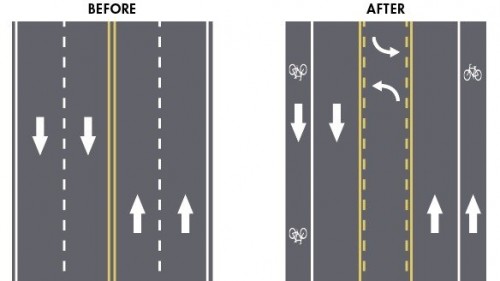Earlier today, the State of California released its anticipated final draft set of changes to the state's environmental law, the California Environmental Quality Act (CEQA). Under the new CEQA rule, environmental studies will use measurements that better correspond to actual environmental costs and benefits. This realigns the CEQA process to foster better transit, more walking and bicycling, and less driving.

Under existing misguided rules, the environmental impact of traffic projects are analyzed by whether or not a project "causes car congestion," that is, whether it decreases a road's "Level of Service" (LOS); projects that add car capacity are deemed environmentally friendly. The new rule replaces LOS with a measurement of "Vehicle Miles Traveled" (VMT).
Dave Snyder, the executive director of the California Bike Coalition, puts it in plain English: "The fact that replacing a bike lane with a mixed-travel lane is exempt from CEQA, while doing the opposite is not, has been a dangerous anomaly in the law for a long time. Removing traffic congestion as a potential impact might solve that problem."
To read the new rules, click here. To provide public comment, email CEQA.Guidelines@resources.ca.gov.
"These guidelines are a tremendous step forward for transit and development in walkable communities," wrote Stuart Cohen, the executive director of TransForm, a Bay Area-based public policy group that advocates statewide for more equitable transportation policy and funding programs.
Today's announcement was hardly a surprise. The proposed regulations were authorized by the legislature and governor in 2013, after the signing of former Senate President Darrel Steinberg's S.B. 743. The legislation proved a mixed bag for environmentalists because it also included changes to state environmental law that make it easier for the construction of a new basketball arena in Sacramento, potentially creating a precedent for other mega-projects to sidestep some environmental approval processes.
Before Streetsblog California began publishing, Streetsblog Los Angeles covered the controversy and success of S.B. 743. Find that earlier coverage here.
While the legislation was controversial in 2013, today was a day of enthusiasm for smart growth and transportation reform advocates for the benefits of the compromise.
"We are excited to see positive outcomes from the guidelines to change the focus from vehicular efficiency to improved accessibility for everyone on the road," writes Kathleen Ferrier of Circulate San Diego. "With this in mind, implementation of the guidelines will lead to not only reduced emissions, but also healthier communities."
Today’s release marks the beginning of a 45-day initial public comment period before finalizing the proposal and submitting to the California Natural Resources Agency to commence the formal rulemaking process under the Administrative Procedure Act. The regulations are anticipated to be effective statewide in 2019.
Public comment ends on February 29 at 5 p.m.
For some, the comment period cannot end--and the changes to environmental law cannot come-- fast enough.
“For decades, LOS has stood in the way of many of the planning decisions that will actually cut carbon and make for better cities: safe bike lanes, transit that runs on time, and new housing near transit and jobs," writes Amanda Eaken, the Director of Transportation and Climate, Urban Solutions at the Natural Resources Defense Council (NRDC).
"RIP LOS.”





